Cross of Iron (1977)
Directed by: Sam Peckinpah
Written by: James Hamilton, Julius J. Epstein, Walter Kelly, Willi Heinrich
Starring: David Warner, James Coburn, James Mason, Maximilian Schell
CROSS OF IRON [1977]
WEST GERMANY / UK
AVAILABLE ON: UHD Steelbook, Blu-ray and DVD from STUDIOCANAL
RUNNING TIME: 133 mins
REVIEWED BY: Dr Lenera
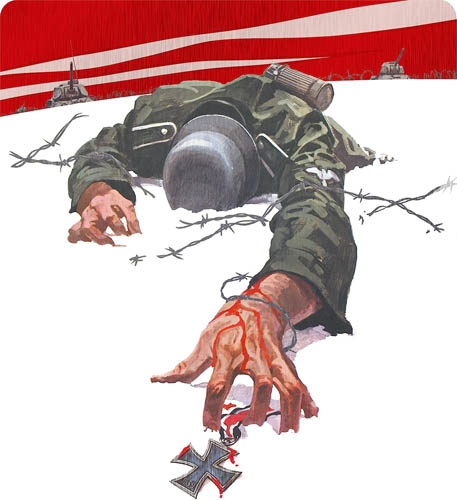
Russia – the Taman Peninsula – 1943, The Retreat. The German army’s invasion of Russia has been a failure, but men like Captain Stransky still believe in the superiority of the German forces and are determined to push their troops into winning. Stransky applies for a transfer from more comfortable duties in occupied France to the Kubab bridgehead so that he can win the Iron Cross. The platoon there is under the command of Captain Steiner; he’s liked by his men and has just won a victory but Stransky thinks he’s too soft. Then Stransky notices that Lieutenant Triebig is a closet homosexual which is a death penalty offence in the German Army and gets him to reveal himself, making Triebig now a person whom Stransky can blackmail in order to aid him in getting the Iron Cross, something helped even more when Steiner gets concussion and is transferred to a military hospital….
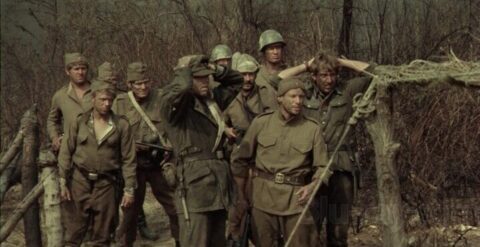
It may seem surprising and even unbelievable, but the worst human carnage in history came in 1941 when Nazi Germany invaded The Soviet Union in 1941, a major mistake. The Battle of Stalingrad was as almost as important as the bombing of Pearl Harbour the same year by the Japanese and the D-Day Landings in 1944 by the Allies on the beaches of Normandy in changing the course of the war. From June 1941 to the final battle of Berlin in April 1945 the conflict between the German and the Russian armies cost the lives of 35 million people. This makes it, if you count the campaigns of World War 2 as separate endeavours, the bloodiest conflict ever. Perhaps that’s why there are very few films about it, considering how so many other conflicts have been depicted over and over again, the most prominent offerings are the relatively recent Enemy Of The Gates and the excellent Stalingrad, though writing about this gives me another opportunity to lament that fact that Sergio Leone never got to make his Leningrad; that would surely hgave been anothet great movie from him? However, another master of cinema, and one who can be compared to Leone in some ways, did make this particular film in 1979 though it’s not one of his better known offerings. Sam Peckinpah made Cross Of Iron when, due largely to his own fault, being a volcanic personality whose excesses only grew with considerable alcohol and drug consumption, his career was in decline and not a lot of people wanted to work with him, nor studios and producers invest in his productions. Yet, having finally seen it, I can say that it belongs almost up there with The Wild Bunch and Bring Me The Head Of Alfredo Garcia. The filmmaker who had a reputation for bloody violence also usually had violence as an ugly necessity for survival, and was therefore a highly appropriate one to tackle war. As you might expect, it has some stunning battle sequences, brilliantly filmed and extremely convincing, but it also gets home the wastage of war, attacks those in command, and seems to present a message that countries don’t matter. Being Peckinpah, he probably also liked the idea of depicting soldiers from the losing side, yet there’s only one Nazi in his film.
It was based on the 1956 novel The Willing Flesh by Willi Heinrich, loosely based on the true story of Johann Schwerdfeger, a highly-decorated combat veteran, though Heinrich drew from his own experiences in the German invasion of Russia where he was wounded many times. In July 1975 EMI Films announced the a film version would be made as a joint Anglo-German production between EMI and ITC Entertainment of London and Rapid Films GmbH from Munich, as part of a slate of eleven films worth £6 million, called Sergeant Steiner and starring Robert Shaw. Julius J. Epstein wrote a script which was significantly rewritten by Walter Kelly and James Hamilton, Although the West German producer Wolf C. Hartwig had secured a budget of $4 million dollars, only a fraction of it was available as pre-production started, causing delays on location because local services and film crews demanded payment before commencing work. The Yugoslav government had promised that all the military equipment would be ready for the start of filming, but half of it was missing just as production was about to begin. Filming took place at Trieste in Italy, Yugoslavia, Obrov in Slovenia, and Zagreb and Savudrija in Croatia, with interiors at Pinewood Studios in England. The script kept being changed, sometimes by Peckinpah himself. Peckinpah, who was constantly at odds with Hartwig, was consuming 180° proof Slivovitz (Šljivovica] every day, and every two to three weeks he’d go on a binge. Due to this and other delays, there were cost overruns of £2 million. With no more money, Hartwig and co-producer Alex Winitsky tried to halt the production on the 89th day of shooting before the final scene had been filmed. Coburn was so annoyed at this he had Hartwig and Winitsky thrown off the set but Peckinpah was only able to film a quick improvised ending. Cross Of Iron did poorly at the box office in the US but performed very well in many European countries and Japan.
It’s obvious right from the offset that Peckinpah still took a lot of care over this movie. The opening credits have as their musical accompaniment a German song [Hanschen Klein] sung by children occasionally interrupted by militaristic flourishes from the orchestra of Ernest Gold’s score which eventually takes over near the end of the lengthy montage of real footage of Hitler youth boys, medal giving, staged shots which show victory in the battlefield, Adolph himself, etc. – it all coming together to show a Germany in happiness with the Nazi ethos. However, as it closes such images are replaced by things like bloody corpses and starving soldiers, already reminding us that Germany invading Russia was where the idea of the superiority of the German military really began to take a knocking, even if we understand that the Battle of Britain was Hitler’s first defeat. Black and white footage becomes colour as our director’s name appears on screen the same time as an explosion. Our group of German soldiers is shown at perhaps their most inglorious [which reminds me that Quentin Tarantino cited this as a major inspiration for Inglorious Basterds, though I’ll be honest and say that I can’t see it] as they slash, stab and choke some Russian soldiers from behind. This successful raid on an enemy morter position results in Captain Steiner’s reconnaissance platoon capturing a Russian boy soldier. Meanwhile Captain Stransky is leaving for his new position. The regiment’s commander, Colonel Brandt, wonders why Stransky would ask to be transferred from more comfortable duties. Stransky proudly tells Brandt and the regimental adjutant, Captain Kiesel, that he applied for transfer to front-line duty in Russia so that he can win the Iron Cross. Brandt and Kiesel have a healthily cynical view of the war and are under no illusions as to how things are going, but Stransky, “pure military Prussian aristocracy and rich“, still believes the war can be won. However, as Brandt tells him, the man he’s most going to working with, Steiner,“Could be a problem. But he’s a first-rate soldier, so we look the other way”.
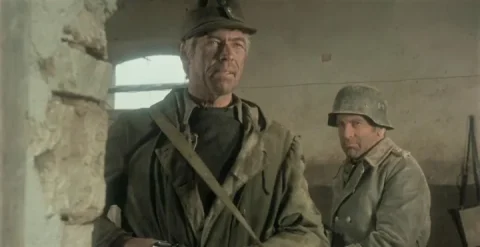
The two are at odds as soon as Stransky shows up in Steiner’s area. He’s not happy with the boy being alive and tells Steiner to shoot him. Then he’s appalled at learning that two men have been killed and one missing, and especially when Steiner tells him that he didn’t send the platoon out to look for him as he felt it was a waste of time and effort considering the circumstances and environment they’re in. However, it’s not that Steiener doesn’t look after his men. He’s pretty lenient and is happy for them to put away the booze and temporarily be happy when the platoon celebrates the birthday of their leader, Lieutenant Meyer, even though Schutze Kern doesn’t think it to be appropriate. Then Stransky notices that Lieutenant Triebig, is a closet homosexual; the scene in which he gets Triebig to actually state this himself is a good example of how well Peckinpah can stage, shoot and sustain dialogue scenes, as Stransky gradually gets Triebig and a soldier named Joseph Kepper to reveal themselves with increasingly clever questions. Triebig is now a person whom Stransky can use, and Stransky certainly wants things. In particular, he wants the Iron Cross, and is prepared to lie and employ pressure in which to obtain it. His plans are easier to get going when Steiner, after being overcome by fear in his bunker while Meyer is killed leading a successful counterattack, is wounded and sent to a military hospital where he gets attacks of major concussion, though we know that, despite having a liaison with a nurse, he’s not going to take home leave, even if it’s rather unbelievable that he’d be able and even want to return to the front that quickly, unless more time is supposed to have passed than we were given the impression of. But surely things would be pretty hopeless out there anyway, with retreat bound to become flight quite soon?
Skirmishes and battles unfold at regular intervals and manage to task of being both aesthetically pleasing and genuinely exciting yet never glamourisng armed conflict and often making us flinch even if some more recent war films have well outdone Cross Of Iron in the blood and gore department. Perhaps the most viscerally thrilling set piece is a tank attack which is staged for maximum effect, with the tanks coming across as metallic monsters, and introduced in a series of quick shots of tanks; the shots seem a bit random and most don’t even match, but what Peckinpah and his editor Terry Ellis and Michael Lawson are trying to do is to give us a sense of what may be going through one of the soldier’s minds as he espies one of the machines – and as well as trying to conceal the fact that they only had two tanks to use. A typical series of shots will have German soldiers in slow motion, Germans in real time, Russians in real time, Germans in slow motion. then a cross cut with a Russian and a German dying at the same time. This might sound like chaos, but it’s no more chaotic than it would be in real life, and is a million miles away from the flash-cut, shaky-cam madness that sometimes forms action in modern movies. resulting n an incoherent, sick-inducing, eye-hurting blur. Away from the battlefield the most memorably filmed moments might be the ones in the hospital where Steiner is hallucinating and we get a combination of flashbacks, real present happening, real present day happening distorted and fantasy which is quite unsettling. The crushed body of a soldier ina road ridden over by truck is another strong image. Saying that, potentially most upsetting is when the platoon comes across an all-female Russian detachment. Some nasty stuff does result, but interestingly the only man who behaves truly badly is the one Nazi. After all, our soldiers, and even their captains, are mostly just ordinary men who are just like ones from any other country that happens to engage in warfare.
The primary conflict is between Steiner and Stransky, the almost mythical war hero who’s loved by his men but just wants to survive, and Stransky, who believes in subordination to country and in the superiority of his class and background buy is not a Nazi; we’re reminded that Hitler hated the class system and would have abolished it. Maximillian Schell makes believable his seemingly almost parodic but probably lifelike character though it’s James Coburn who truly excels, giving the best performance of his life that I’ve seen [and this is coming from someone who has A Fistful Of Dynamite as one of his top twenty films of all time]; we feel his weariness, his fear, his essential but not cloying decency. He creates a whole, rounded character even though the role actually seems a little thin. James Mason and David Warner share a lot of chemistry as Brandt and Keisel. Saying all this, the combination of German accents from the German actors and no attempt being made to sound German at all by the non-German actors can sometimes be distracting, and the low budget occasionally can’t help but show through such in the use of aircraft footage which is obviously taken from another film. Gold’s score consists of mostly quiet, melancholy pieces only really going into Rousing War Movie Mode at the end, where it’s clearly intended to be ironic. We don’t really miss the lack of the final intended action scene, a series of freeze frames working well enough. After all, we know what’s probably going to happen next anyway, and a character’s laugh, as he seems to become at one with the madness all around him, is rather chilling. What a waste. What utter stupidity. And what a film. Cross Of Iron deserves much wider recognition as both a particularly strong war movie and a particularly strong anti-war movie.
Rating: 









I watched the Blu-ray version as I don’t support UHD. The transfer is generally superb, with considerable sharpness and a range in tones in a film which, due to its nature, you’d think would have quite a limited palette of hues. There are, though, a few instances where the colour changes slightly for a few seconds; they aren’t jarring though.
SPECIAL FEATURES
DISC ONE
Audio Commentary by filmmaker and film historian Mike Siegel
A contributor to and author of lots of DVD and Blu-ray special features as well as books and separate documentaries, and especially about Peckinpah, Siegel is hugely qualified to do this commentary as well as produce the other special features. He warns that he doesn’t do scene by scene analysis, though we don’t really miss it; perhaps he discusses too much his own experiences with Peckinpah alumni for his retrospective sand documentaries, but then, as he says, he didn’t want to repeat himself, with lots of background information on his Passion and Poetry: Sam Peckinpah’s War featurette, while for many years information about the production was scant until Siegel himself was shown the German archives whch were a treasure chest to him; his excitement is lovely to hear. Justifiably proud of having found a director’s cut of Peckinpah’s The Osterman Weekend last year, Seigel says how Cross Of Iron has been meaningful to him since he first saw it as a kid due to family members having died in the war it depicts, and tells of how the lights had just gone down during a Woody Allen concert when cast member Senta Berger and her husband turned up to sit on the only two empty seats which were next to him while we learn that Peter Slovich directed some scenes. Usually interesting even if I could have done with more about the actual film itself; though I’ve already stated the main reason for that.
NEW Promoting Steiner [10 mins]
Siegel found loads of stills, lobby cards, posters etc. in the German archives and shares many of them with us in this and the next three featurettes which unfold as slide shows, with excerpts from the soundtrack playing over them. Many of these also appear in the following featurettes, so it may be preferable to watch those first. Nonetheless, if you have an interest in promotional material [I do], then these will be very interesting.
NEW Steiner on the set [10 mins]
NEW Filming Steiner [10 mins]
NEW Filming Steiner pt 2 [10 mins]
NEW STEINER in colour [10 mins]
DISC TWO (Steelbook & Blu-Ray only)
Passion and Poetry: Sam Peckinpah’s War [47 mins]
All the special features on this disc were on the North American Hen’s Tooth Blu-ray from 2018. I’m not sure why Second Sight haven’t included this disc in the DVD set, but then again will many people be buying the DVD? I doubt it. Seigel says that he originally wanted this documentary to be two hours long, and I’d have been fine with that, as it’s so very good. There are loads of great stories told by cast members in the past via recordings and in the present. There’s Vadim Glowna, who played Kruger [“natural body oils, combined with dirt, keeps you waterproof”] being asked by Peckinpah that he wants to “f***” the young lady Peckinpah’s with, he replying yes and Peckinpah telling him it’d his daughter before giving him the part. David Warner having two requirements which the prroducers turned down, then Peckinpah saying “no Warner, no Peckinpah”. The Yugoslavian food being so poor that Peckinpah got a cow and cooked it for everyone over a huge fire. I especially liked hearing from Coburn about him taking Peckinpah to a Shiatzu healer which eventually curbed his heavy consumption. Warm yet also honest when it needs to be, this is a fine example of how to do this sort of thing right.
Kruger Kisses Kern [8 mins]
Glowna tells a great story of getting the part; he annoyed Peckinpah on their first meeting and by then repeatedly turning up on set, but eventually got Peckinpah to use him and do a scene his way even though Peckinpah still did it his way. Chaos understandably resulted.
Vadim & Sam: Father & Son [6 mins]
This could be been included with the material on the above featurette, but never mind. Glowna tells of his eventual friendship with Peckinpah, including disagreements on rushes and showing Peckinpah his first feature film, Peckinpah having suggested that he direct.
Cutting Room Floor [4 mins]
It seems like very little cut material has survived; all we get are some stills and a few seconds of Coburn and Berger frolicing in the countryside, a scene which would have provided a nice idyllic break from everything else. But Warner talks of the convoy being attacked by aircraft, which would have probably been a major action sequence but was probably not used because of the lack of aircraft available. Schell also mentions another bit between him and Coburn, continuing their conflict.
Steiner in Japan: Ads filmed in 1977 [2 mins]
Two advertisements with Coburn acting cool and Peckinpah is supporting parts; in the second one the latter is one of several men Coburn beats up.
Mike’s Home Movies: Steiner & Kiesel Meet Again [7 mins]
Footage from Siegel’s 2000 retrospective, beginning with shots of an exhibition befopre showing some cast reuions. More nice stories include Peckinpah having to hire another assistant director to teach the Serbian army how to fight, and Mason not being sure about the movie and only delivering a nuanced performance when he saw some rushes,
On Location: Sam Peckinpah [5 mins]
Parts of these radio bits, heard over stills, appear in earlier features, but it’s nice to have them in full. Peckinpah says how the fuss over his violence is nothing compared to news footage, and that the German soldiers were soldiers from birth and convinced by their leaders that they had to atone for losing World War 1.
On Location: James Coburn [5 mins]
Coburn says that the German troops by now were fighting on sheer will and reveals that Peckinopah initially had troule with the idea that they were ordinary people.
On Location: Maximilian Schell [4 mins]
Schell, hoping his career will now improve, calls Peckinpah “the first director who has a sense of poetry that I’ve found”, and says that it’s possible that his character was right in terms of fighting the war.
On Location: James Mason [ [6 mims]
Mason says how Peckinpah is a great director because of his way of “filling out and enriching a film scene by scene” and compares his character to Erwin Rommel.
On Location: David Warner [3 mins]
Warner says that “it was a challenge to explore other aspects of the military” and that he had no problems with Peckinpah despite his notoriety.
US/UK Trailer [3 mins]
German Trailer [3 mins]
US TV Spot [1 mins]
A very fine war movie given a very fine release which does it justice. Highly Recommended!


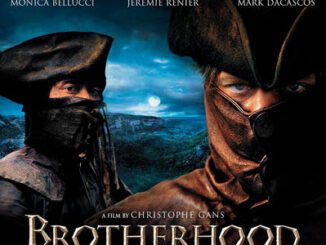

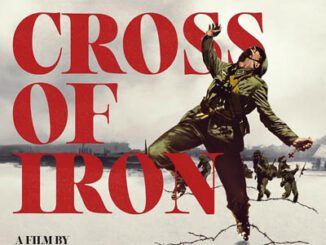
Be the first to comment